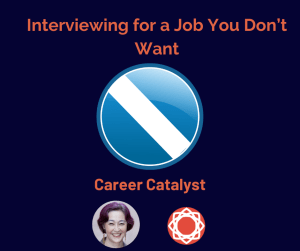
Have you ever been asked to interview for a job you don’t want? Whether you accept the interview and how you approach it will vary depending on your situation.
Situation 1: You Need a Job
If you’re in that place of simply needing employment of any kind, prepare as you would for any interview. Think about why you are able to do the tasks, practice typical interview questions, and really focus on presenting yourself well. It can be helpful to identify any aspects of the role you genuinely find interesting, which will give you some enthusiasm for the interview.
Situation 2: You Need Practice
I suspect most people will fall into this category. Free interview practice is never a bad thing, after all! And the nice thing in this case is that the stakes are low: you don’t really want this job, so you can try various answers to typical questions, and you can determine which questions you really want to ask them.
It’s also a smart move to learn more about the role and any other opportunities within the organization, so don’t think of the interview as a throwaway. It’s not unusual for there to be something else in the company that would truly appeal to you, and as an inside candidate, you’d be in a much stronger position to get that role than otherwise.
You can also use the interview as a bit of relationship-building if you’re interested in the industry or employer. Be careful about not wasting their time, of course. You might even opt to turn down the interview but let the recruiter know you’re interested in the company, for instance, and then work to build that relationship.
Situation 3: You Need to Keep the Unemployment People Happy
This is probably the trickiest of the situations because you’ll lose your benefits if you turn down an job offer. At the same time, you probably don’t want to come off like a complete idiot, or to risk performing badly in front of someone who might have connections. So your best bet is to prepare well for the interview, and also to give yourself lots and lots of questions to ask them, including things you might not otherwise ask, including salary questions. (You do still want to be professional, though: “This would represent a 15% pay cut for me, so while salary isn’t my only consideration, how quickly might I be able to qualify for a substantial raise?”)
It’s still valuable to try to keep an open mind, even in this situation, because sometimes jobs turn out to be more interesting than they seemed, or there are growth opportunities that appeal to you. So prepare yourself as you would in Situation 1, but have those tough questions ready to go for if you feel like it’s not a good fit. Front-end those questions with firm but polite information about yourself: “I perform my best work when I am in a quiet setting. I know that this is an open plan office, but is there a quiet room I might use when I’m working?” “This role would be very junior to work I have done in the recent past. How quickly might I be able to move up if I got this job?”
Situation 4: You Are Already Overcommitted
You may also find yourself in a position where you just don’t have time to prepare for and actually commit to an interview. For example, you might be doing some caretaking of a sick relative, or you might already have a job you don’t especially like but it takes up most of your workday. Since there isn’t anything particularly compelling about the role you might interview for, you can tell them you aren’t able to find the time for an interview.
Situation 5: You’re Confused
As with the previous situation, in these circumstances, it’s okay to turn down an interview offer. Often, especially after a layoff or a termination, people feel very uncertain about what they want next. If an interview is unlikely to clear things up for you, simply tell them you’re going in a different direction or you’re taking an intentional career break. Take some time to consider what you really want the next thing to look like, what you liked about your last role, and the directions you’d like to grow.
Situation 6: It’s a Total Values Misalignment
If you’ve read up on the employer and it’s absolutely not a place you would consider under any circumstances, good news! You can simply tell them no. You don’t even have to say why. Just tell them you’re not interested and wish them luck. Now you’re free to pursue things you might actually want!



